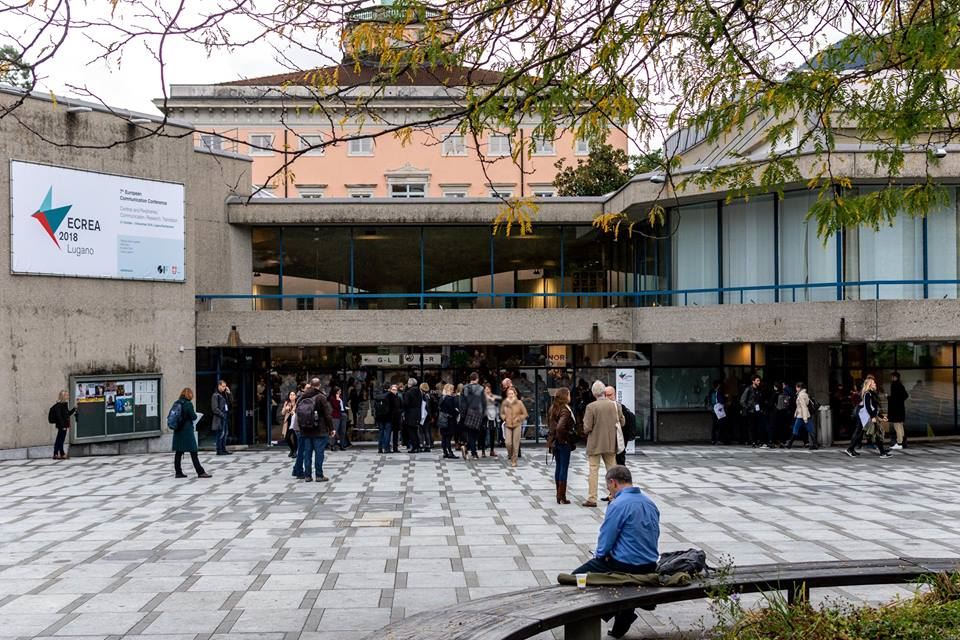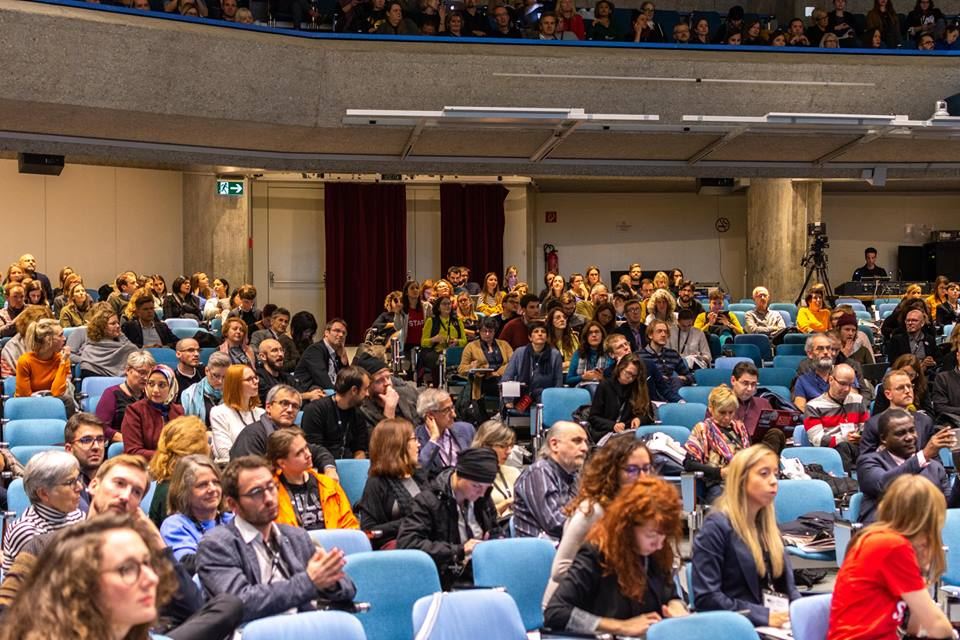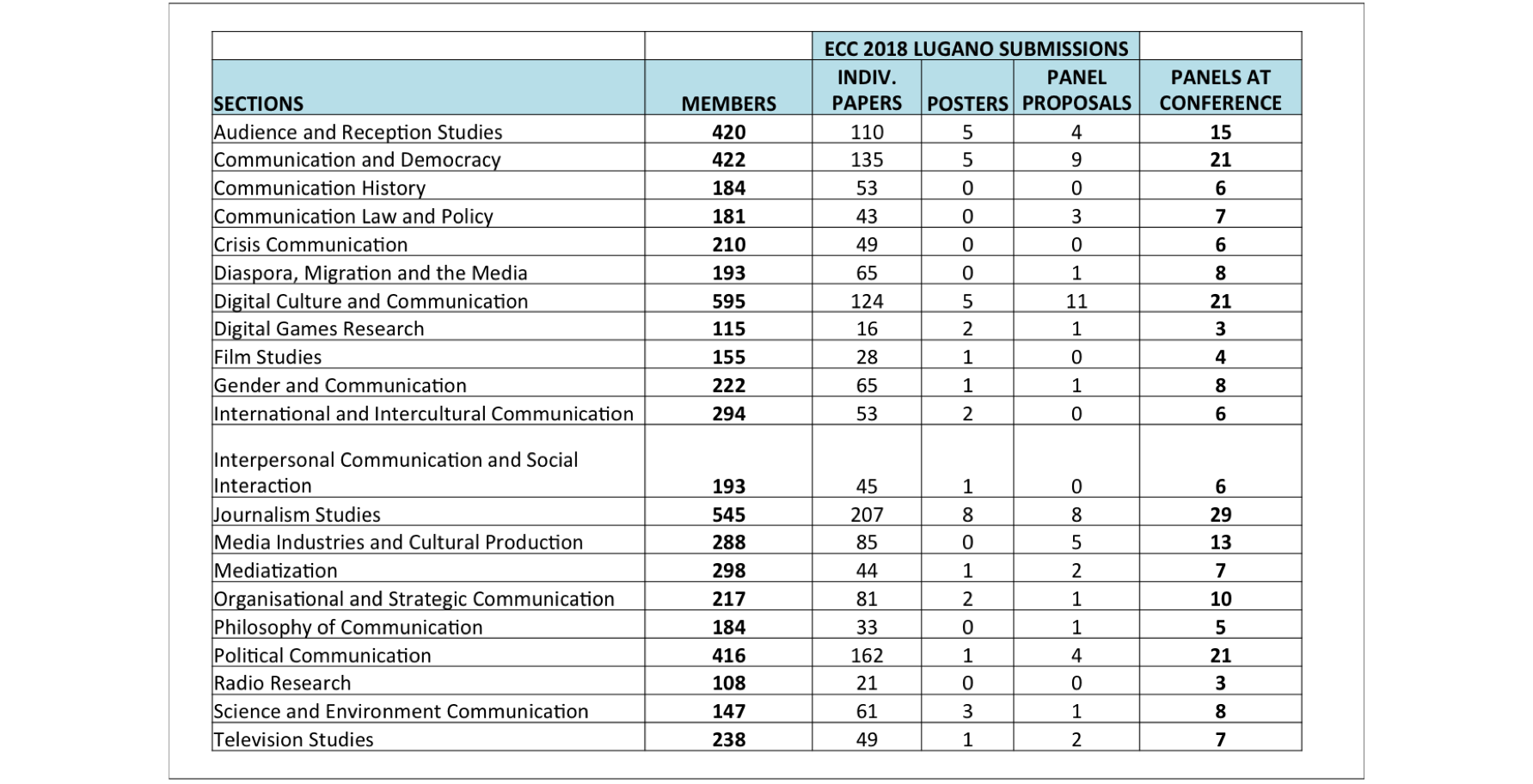The ECREA biennial European Communication Conference (ECC) took place in Lugano, Switzerland from 31st October to 3rd November 2018. The theme was Centres and Peripheries: Communication, Research, Translation. The Newsletter informed you about all the important things running up to the conference. Now, we are happy to report, on behalf of the local as well as the international organising committee of the conference, that the ECC 2018 has successfully concluded.
Here, we bring you some quantitative data to summarise the event. We are happy to report that this was the biggest ECC so far with 1248 participants. The greatest number of participants came from Germany, United Kingdom and Switzerland, followed by participants from Spain, Sweden, Denmark, Netherlands, Belgium, Finland and Portugal (see below). More than one quarter of participants (350) were PhD students, out of which 10 were granted an ECC travel grant and fee waiver by ECREA with cooperation of YECREA. In total, 983 speakers presented 1012 presentations. The average presentation had 19 slides, and as you can see in the attached graphic overview, most of the speakers uploaded their presentation more than two hours before their presentation took place. Thank you all.
happy to report that this was the biggest ECC so far with 1248 participants. The greatest number of participants came from Germany, United Kingdom and Switzerland, followed by participants from Spain, Sweden, Denmark, Netherlands, Belgium, Finland and Portugal (see below). More than one quarter of participants (350) were PhD students, out of which 10 were granted an ECC travel grant and fee waiver by ECREA with cooperation of YECREA. In total, 983 speakers presented 1012 presentations. The average presentation had 19 slides, and as you can see in the attached graphic overview, most of the speakers uploaded their presentation more than two hours before their presentation took place. Thank you all.
Those interested in Journalism Studies had hard choices to make, as this section had 29 panels running throughout the conference. The Communication and Democracy, Political Communication, and the Digital Communication and Culture Sections had 21 panels each, and the Audience and Reception Studies Section ran 15 panels in total (see the table for more details on the other sections).
From the corridors and coffee break discussions, we are happy to report that people commented very positively on the ECC, finding presentations of interest and diving deep into the topical discussions.
The conference also hosted three all-female keynote presentations. Eszter Hargittai opened the conference with her nerdy Halloween candies but most importantly with her presentation on The online participation divide. Her research goes beyond asking whether people participate or not, but further looks at what determines the quality and effectiveness of their participation. She argues that the crucial factors are personal internet skills that are not correlated with one’s age, but rather to people’s differing socio-economic status. She also shows that there is a gender gap, not necessarily in people’s internet skills, but rather in people’s self-perception of those skills, as women tend to underscore their skills in comparison to men.
The second opening keynote speaker was Lina Dencik with her presentation Resistance in the datafied society: From data ethics to data justice. In her presentation, starting from the increasing reliance among governments on collecting data about their citizens (as we could see with the Snowden leaks), she argues that attention needs to be paid to decision making that is informed by algorithmic analysis (whether it is for policing, use of social services, etc.) as this is grounded in the belief that such data are unbiased in their predictive capacity. She argues, that these predictions come not only at the cost of people’s privacy, but are also inaccurate, and just as importantly reinforce existing inequalities, calling for the decentralisation of data and claiming data back, within a broader political agenda of social justice.
 On Friday morning, José van Dijck addressed conference attendees in the third day’s keynote presentation on The geopolitics of platforms: Lessons from Europe. In her presentation she focuses on the implications of the platform society, arguing that Europe is beingsqueezed between the big tech companies from the US and China that act as gatekeepers to the public sphere and shape social and cultural affairs, dominating the infrastructures of health, transportation, education or news. She argues that Europe has a great need to negotiate and articulate its own public values and norms in relation to security, privacy, accuracy and transparency. She outlined the following challenges for Europe in the future: how to devise a comprehensive approach to the ecosystem, articulate value centric principles, update regulatory frameworks, and stimulate non-profit and public platforms.
On Friday morning, José van Dijck addressed conference attendees in the third day’s keynote presentation on The geopolitics of platforms: Lessons from Europe. In her presentation she focuses on the implications of the platform society, arguing that Europe is beingsqueezed between the big tech companies from the US and China that act as gatekeepers to the public sphere and shape social and cultural affairs, dominating the infrastructures of health, transportation, education or news. She argues that Europe has a great need to negotiate and articulate its own public values and norms in relation to security, privacy, accuracy and transparency. She outlined the following challenges for Europe in the future: how to devise a comprehensive approach to the ecosystem, articulate value centric principles, update regulatory frameworks, and stimulate non-profit and public platforms.
The plenary sessions were closed by a new session format called ECREA Critical Interventions, a participatory format where an introductory thematic talk is followed by extensive time for questions, but also personal contributions from among the audience. This year, the invited speaker Thomas Allmer discussed the dilemmas, challenges and pitfalls of academic life and labour, elaborating the precarious conditions of academics in the neoliberal society. His talk strongly resonated with the audience who recognised themselves in those accounts.
The central space of the Palazzo dei Congressi was buzzing with debates among colleagues, carrying on discussions after panels, as well as planning new projects and collaborations. These were paralleled by conversations on social media. According to local organisers, the conference hashtag #ecrea2018 was constantly trending as 1st and 2nd on Twitter Switzerland with an engagement level of 1200 (retweets, likes, replies). Furthermore, the conference account @ECREA2018Lugano had around 600 tweets per day, 5143 organic coverage; around 2000 reactions (like, shares, comments) on Facebook; and hundreds of stories on Instagram accompanied with 380 posts mentioning ECREA and only positive sentiment on that platform.
The four days of intensive discussions took its toll in the form of 7000 coffees drunk during the conference.
Many thanks to all the organisers, presenters, attendees and all those who helped to make ECC2018 a great ECREA conference.
See you all in two years on 2-5 October 2020 in Braga for ECC2020!
Photo credit: Facebook page ECREA 2018 Lugano

Source: C-IN

Source: ECREA